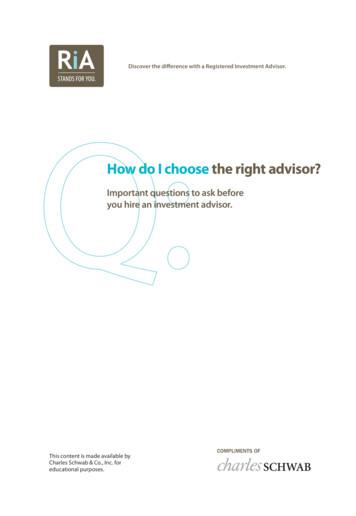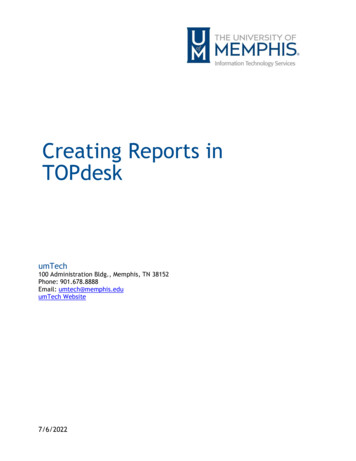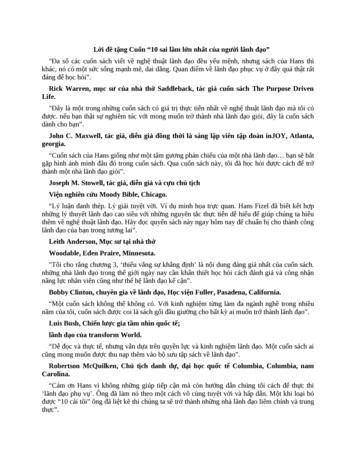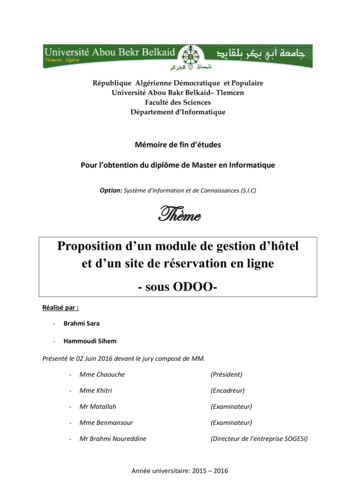
Transcription
Discover the difference with a Registered Investment Advisor.How do I choose the right advisor?Important questions to ask beforeyou hire an investment advisor.This content is made available byCharles Schwab & Co., Inc. foreducational purposes.
To choose an advisor you feelcomfortable with—both personallyand professionally—it’s smart to takeyour time, talk face-to-face and ask theright questions.
Are you looking for your first investment advisor?Or do you feel that your current advisor no longermeets your needs? This booklet can help you ask theright questions to make an informed choice.Questions to Ask YourselfWhat are my choices? . . . . . . . . . . . . . . . . . . . . . . . . . . . . . . . . . . . . . . . 3Where do I start? . . . . . . . . . . . . . . . . . . . . . . . . . . . . . . . . . . . . . . . . . . . . . 4Questions to Ask AdvisorsWhat are your credentials? . . . . . . . . . . . . . . . . . . . . . . . . . . . . . . . . 7Do you offer the services I need? . . . . . . . . . . . . . . . . . . . . . . . . 8How are you compensated? . . . . . . . . . . . . . . . . . . . . . . . . . . . . . . 10How will we work together? . . . . . . . . . . . . . . . . . . . . . . . . . . . . . . 11How do you approach investing for people like me? . 12Where will my assets be held? . . . . . . . . . . . . . . . . . . . . . . . . . . . 13My NotesUse these pages to prepare for advisor conversations . 14
Questions to Ask YourselfBeing able to clearly articulate your needs and expectationswill help you and the advisors you talk with make an informeddecision about whether you’re right for each other.Suggestion: List the reasons you’re looking for an advisor inMy Notes on page 15.2
What are my choices?When you’re choosing an advisor, trust is essential. You canfind advisors in a variety of places—in a larger financial firmsuch as a brokerage house or bank, or in an independentadvisory firm. This brochure is designed to help you learnabout and select an independent registered investmentadvisor (RIA), but can also be used more broadly to select anadvisor in general.*Why an independent RIA may be a good choice for youThey’re independentIndependent RIAs generally have affiliations with a variety offirms that assist with tax planning, estate planning, moneymanagement and more. These affiliations allow RIAs to helptheir clients with complex financial needs.They’re usuallyfee-basedIndependent RIAs often charge fees based on a percentageof your assets—so growing your portfolio benefits you both.Your assets aregenerally held bya third partyIndependent RIAs typically manage your assets in an accountthey open for you with a third-party custodian—a bank orbrokerage firm. The account is in your name, and the custodian sends youaccount statements that detail all the transactions youradvisor has made for you. You may pay the custodian for its services separately fromwhat you pay your advisor.* This brochure is not intended as a recommendation or endorsement of any specific advisor. Youmust decide whether to hire an advisor, what authority to give the advisor and what type of advisoris right for you.3
Where do I start?Whether you’re starting with a list of recommended advisorsor you have a specific advisor in mind, the following threesteps can help you make a thoughtful choice.1Start with a preliminary screening.You can review pertinent information about an advisor evenbefore you meet. All RIAs are required to publicly disclosedetails about their business by filing a Form ADV. You canreview the Form ADV on the SEC website for federallyregistered RIAs at www.adviserinfo.sec.gov. Form ADV Part 1 describes an advisor’s advisory services,compensation, disciplinary history and other aspects of itsbusiness operations. Form ADV Part 2 describes an advisor’s services, fees andinvestment strategies. Advisors are required to give youPart 2 information before you hire them.Keep in mind that not all investment advisors are registered.State-registered RIAs may not file a Form ADV, and advisorswho are exempt reporting firms only complete parts ofForm ADV.Things to check on Form ADV:*Type of businessAssets under managementAffiliations with other financial services companiesServices offeredDisciplinary history* Other information is available on Form ADV. This list is not all-inclusive.4
2Know your investment objectives.Identifying your objectives will help you select an advisorwho is in tune with your ultimate goals and personalpreferences. Advisors will want to know:Your investment goals— What are you working toward:A comfortable retirement? Leaving a legacy?Philanthropic goals?Risk tolerance— How much fluctuation in value can youtolerate in exchange for the opportunity to earn aboveaverage returns?Time horizon— When will you need to withdraw moneyfrom your investments?Income needs— Do you need current income from yourportfolio? How much?3Prepare tointerview advisors.As you begin to talk withadvisors, you’ll want toevaluate them objectively.Asking each advisor aconsistent set of questionswill help ensure that youhave the information youneed to make a goodcomparison.Suggested questionsstart on the next page ofthis booklet.Tax situation— Does your tax bracket require a taxsensitive strategy?Other holdings— Do you have significant wealth tied upin real estate or other illiquid assets?Other needs— Do you have complex planning needsrelated to wealth transfer, executive compensation, riskmanagement, business succession planning or philanthropic planning?Suggestion: Jot down your objectives in My Notes onpage 16.5
QuestionsQuestions toto AskAsk AdvisorsAdvisorsAn advisor you’ll be comfortable working with is one whoAnadvisoryouryou’llquestionsbe comfortableworkingwith is onewhowelcomesand givesyou answersyou derstand.understand.If you don’t understand something, ask, ask and ask again.If you don’t understand something, ask, ask and ask again.66
What are your credentials?An advisor’s professional designations can tell you a greatdeal about his or her education and areas of expertise.Common Credentials*CFP (CERTIFIED FINANCIAL PLANNER )CFPs have completed university-level financial planning coursework andpassed a 10-hour exam covering nearly 90 topics, from group medicalinsurance to derivatives.More information: www.cfp.netCFA (Chartered Financial Analyst )CFAs must pass three exams, each of which demands a minimum of 250hours of study and includes corporate finance and financial statements.More information: www.cfainstitute.orgPFS(Personal Financial Specialist)PFSs are certified public accountants who specialize in personal financialplanning. The credential requires a detailed exam and significant financialplanning expertise.More information: www.aicpa.orgCIMA (Certified Investment Management AnalystSM)CIMAs focus on asset allocation and typically complete final coursework atthe Haas School of Business at the University of California, Berkeley, or at theUniversity of Pennsylvania’s Wharton School of Business.More information: www.imca.org* Not a complete list of certifications. There is no implied endorsement of one certification overanother.Suggestion: Visit the website of the organization that issuedan advisor’s credential to verify that the advisor is a memberin good standing.7
Do you offer the services I need?Investment advisory practices vary widely in the services theyprovide. In general, they fall into one or a combination of thecategories listed below.Money managersFinancial plannersIf you need someone to manage yourportfolio and do your investing,consider money managers. They:If you need someone to reviewyour situation and help with bigpicture planning, consider financialplanners. They:Design investment portfolios,generally consisting of stocks, bondsand other individual securities.Often manage the portfolio on adiscretionary basis, meaning that youauthorize the advisor to trade onyour behalf without the need foradvance approval from you.May not offer general financialplanning services.8Help you look to the future and dolong-term financial planning in theareas of retirement, college funding,wealth transfer, tax planning andinsurance.May not offer investing and portfoliomanagement services.
Wealth managersServices I need from an advisor:If you need an advisor who can handleboth your investing and your planningneeds, consider wealth managers. They:InvestingProvide highly personalized, comprehensive financial planning as well asinvestment and portfolio managementfor high-net-worth clients.Coordinate with other professionaladvisors, such as attorneys andaccountants, to serve more complexfinancial needs, which may include taxminimization, trust management,wealth transfers, real estate management, portfolio performance analyticsand more.Portfolio analysisPortfolio designDiscretionary portfolio managementOngoing investment adviceCash managementBudgetingRetirement incomePlanningRetirementEducation fundingBusiness successionCharitable givingPersonal and business lendingWealth transfersTrusts and estate plansInsurance review9
How are you compensated?Knowing how your advisor is compensated may help youevaluate the relative objectivity of the recommendationsyou receive. RIAs generally work on a fee-only or fee-pluscommissions basis.Types of compensation and what they mean to you:Fee onlyAsset-based, hourly or flat fees: Many RIAs charge a percentage of theassets they manage for you (typically 1%–2%). This compensationmethod rewards your advisor for growing your portfolio. Hourly orflat fees are often associated with a specific, one-time service (e.g.,developing a financial plan). The fee may vary by account size andservice. In addition to these fees, you may pay commissions and/orother fees for execution of the trades your advisor makes and forcustody of your assets.Fee plus commissionsAlong with an advisory or financial planning fee, some advisors mayreceive a portion of the commissions you pay when you buy or sellcertain financial products that the advisor recommends, such asinsurance policies or annuities.Commissions onlyAdvisors sometimes receive only compensation from sales commissionson the investments they buy and sell for you. This method may give theadvisor an incentive to recommend that you buy and sell more often.Wrap feesSometimes advisors charge a “wrap fee,” which is typically a singleasset-based fee for both the advice they provide and the execution ofthe trades they make.10
How will we work together?Good communication between you and your advisor isessential. Asking the questions below can help you judgethe amount of attention and regular communication youcan expect.What to ask:Who will I work with?In some cases, the firm’s principal may conduct your initial meeting,and then turn your portfolio over to an associate or a team whoactually manages it. If personal rapport is important to you, ask tomeet personally with the people you’ll be working with.How often will we communicate?Regular contact helps ensure that you and your advisor are clear aboutyour financial goals, risk tolerance and investment strategy. Typicallyyour advisor meets you in person at least annually—and stays in touchmore frequently by phone and email.How will you report performance?At a minimum, you should expect to receive: Account statements from the advisor or custodian/brokerage firmwhere your assets are held Quarterly summaries of year-to-date investment performance A comprehensive annual performance report from your advisorWhat is the size of your firm?A firm’s size—including the number of employees, assets undermanagement and the average portfolio size—can have a bearing onthe quality of service you receive. Large firms may have more resources—an important consideration ifyour needs call for specialized services. Small firms may offer morepersonalized attention. The average portfolio size of the advisor’s other clients helps youunderstand your potential fit with the firm.11
How do you approachinvesting for people like me?Before discussing investments an advisor should get to knowyou, your financial issues and your goals for today and thefuture. This will allow the advisor to give investment advicethat’s rooted in a deep understanding of what you want toachieve and can be tailored to your specific needs.Performance Ask to see portfolio performance numbers for up and down markets. Ask the advisor to compare the performance with relevantbenchmarks, such as the S&P 500 , during the same time period. An advisor should at least meet—and preferably beat—thebenchmark.Investment style Advisors may specialize in certain types of investments (such asmutual funds, stocks or bonds) and styles (such as growth or value). You can assess whether the advisor’s methodology or style alignswith your objectives. Asking about an advisor’s investment style is a good way to makesure that the advisor can explain his or her approach clearly and in away that you understand.Decision making Advisors who have a disciplined approach to decision making maybe more likely to stay focused on your long-term goals. Many advisors use an asset allocation strategy that has a history ofsuccess over time. Your strategy should be based on your goals, timehorizon and comfort with risk. Knowing how often an advisor adjusts portfolios can indicatewhether the advisor uses a strategic, long-term approach or investsin short-term trends.12
Where will my assetsbe held?RIAs typically use independent custodians—generallybrokerage firms or banks—to hold and safeguard theirclients’ stocks, mutual funds and other assets.Why should you ask this question?You want to be confident that your advisor has chosen a custodian that meetsor exceeds the security measures required by industry regulators to protectyour assets. Look for a custodian with important services like trade execution andpreparation of monthly brokerage statements, which will allow your advisorto concentrate on managing your portfolio. Ask about the custodian’s policies to protect both personal and financialinformation from unauthorized activity.We hope this guide will help youchoose an advisor who is right for you.You can find more information about choosingadvisors on these websites.Professional designations and what they mean:www.finra.orgProtection for brokerage accounts:www.sipc.orgAccess to Form ADV for RIAs:www.adviserinfo.sec.gov13
[ My Notes ]As you begin your search for an investment advisor, you may find it helpful to jot downyour thoughts and comments on these pages. Keeping everything in one place— including notes about your own needs and goals and the questions you want to ask— can help make your search more productive.14
[ My Notes ]Why I’m looking for an advisorSharing your reasons can give advisors a better understanding of your priorities.If you’re currently investing on your own:My portfolio has grown too complex to comfortably manage.My portfolio is not meeting my performance goals.I want someone else to do the day-to-day investing.I’d rather be spending my time on other things.I need help with a plan that addresses my entire financial picture.I need help with a windfall, such as money from a home sale.I’m retiring and want to create a reliable income stream.I want help with tax-efficient investing or developing an estate plan.If you’re already working with an advisor:My portfolio has outgrown my advisor’s expertise.I question the advice I’m currently receiving.The advice I receive doesn’t reflect my goals, situation, life stage or risk tolerance.My advisor doesn’t seem to be listening to me.Other reasons:15
[ My Notes ]My investing objectivesTo help an advisor understand your current situation and goals, you may find it helpful to jotdown your thoughts before meeting.My investment goals— What am I working toward: A comfortable retirement? Leaving alegacy? Funding college?My comfort with investment risk— How much fluctuation in value can I tolerate in exchangefor the opportunity to earn above-average returns?My time horizon— When will I need to withdraw money from my investments?My income needs— Do I need current income from my portfolio? How much?16
[ My Notes ]My tax situation— Does my tax bracket require an investing strategy that minimizes taxes?Other holdings— Do I have significant wealth tied up in real estate or other illiquid assets?Other needs— Do I have complex planning needs related to wealth transfer, executivecompensation, risk management, business succession planning or philanthropic planning?Not sure about yourobjectives?“I don’t know” is a perfectlyfine answer. Advisors oftenbegin by helping youarticulate your objectives.17
[ My Notes ]QualificationsProfessional credentials?Education?Years of experience?18
[ My Notes ]ServicesInvestingPortfolio analysisPortfolio designPortfolio managementOngoing adviceCash managementBudgetingRetirement incomePlanningRetirementEducation fundingBusiness successionCharitable givingPersonal and businesslendingWealth transfersTrusts and estatesInsurance reviewCompensationFee only?Fee and commissions?Commissions only?Wrap fees?19
[ My Notes ]PerformanceInvesting style?Decision making?Results?RelationshipPrimary contact?Number of clients served?Average assets per client?Communication frequency?20
[ My Notes ]CustodyAssets in my name?Independent custodian?Name of custodian?Visit www.riastandsforyou.comfor more information.21
The S&P 500 Index is an index of widely traded stocks. Indexes areunmanaged, do not incur fees or expenses and cannot be investedin directly.This content is made available by Charles Schwab & Co., Inc. foreducational purposes. 2011 Charles Schwab & Co., Inc. All rights reserved. Member SIPC.CS14919-15 (0911-5143) SLS63878-01 (10/11)
An advisor you'll be comfortable working with is one who welcomes your questions and gives you answers you can understand. If you don't understand something, ask, ask and ask again. 6 Questions to Ask Advisors An advisor you'll be comfortable working with is one who welcomes your questions and gives you answers you can understand.











